
Class activities of teachers and students of the nursery class at Son Ca Kindergarten, Tan Binh District, Ho Chi Minh City in the newly built school - Photo: NHU HUNG
On May 22, the National Assembly discussed in groups a draft resolution on universalizing preschooleducation for children aged 3-5. Along with that is a draft resolution on tuition exemption and tuition support for preschool children, general education students, and those studying general education programs at educational institutions in the national education system.
National Assembly delegates all expressed their high agreement with the two resolutions and proposed many contents to soon implement these policies of great humanistic and social security significance.
Free public tuition, support for non-public tuition
The draft resolution on tuition fee exemption and support aims to concretize the conclusions, resolutions and documents of the Party on innovation and improving the quality of social policies, ensuring superiority and fairness in education. The resolution adds subjects exempted from and supported by tuition fees including preschool children under 5 years old and high school students, and those studying general education programs. The resolution is expected to be passed at this session, applicable from the 2025-2026 school year.
According to the draft, the state budget will support tuition fees for preschool children, high school students, and those studying general education programs at private and public educational institutions.
The reason, according to Minister of Education and Training Nguyen Kim Son, is that 5-year-old preschool children at private and non-public facilities, primary school students at private schools in areas where there are not enough public schools, and secondary school students at private facilities are receiving tuition support from the state budget.
Therefore, the regulation on support for students at public and private educational institutions fully demonstrates the superiority of the regime, ensuring consistent implementation of policies, fairness in access to education; encouraging the development of non-public education, and enhancing the socialization of education. This regulation is consistent with the Constitution, the Law on Education and the policy of the Politburo.
Assessing the impact on the state budget, the Minister of Education and Training said that according to statistics for the 2023-2024 school year, the country currently has 23.2 million students (including 21.5 million public students, accounting for 93%; 1.7 million non-public students, accounting for 7%).
The total funding requirement calculated based on the average minimum tuition fee of the three regions (urban, rural, mountainous) is about 30,600 billion VND, of which the public sector is 28,700 billion VND, and the private sector is 1,900 billion VND.
In addition, there is also funding to exempt and support tuition fees for students of general education programs at continuing education institutions and other educational institutions, which is 774.2 billion VND for 431,551 students (all are public students, currently there are no private students).
The specific budget level to be guaranteed will depend on the specific tuition fee level of each province or centrally-run city under the authority of the provincial People's Council.
Examining this content, Chairman of the Committee on Culture and Society Nguyen Dac Vinh said that the committee basically agrees with the policy of supporting tuition fees for non-public students, but recommends that the Government study and regulate the payment of tuition support for this group by directly providing it to students.
Mr. Vinh added that through consultation, some members of the review agency said that the law does not yet stipulate tuition exemption for students of general education programs at continuing education institutions.
This policy has not yet been regulated for preschool children in private educational institutions; primary school students in private educational institutions in areas with sufficient public schools; and secondary and high school students in private educational institutions. Therefore, the committee requested the drafting agency to review the beneficiaries of the policy.
In case of further expansion, the Government needs to report to competent authorities for conclusions so that the National Assembly has a basis for institutionalization, decision and implementation.
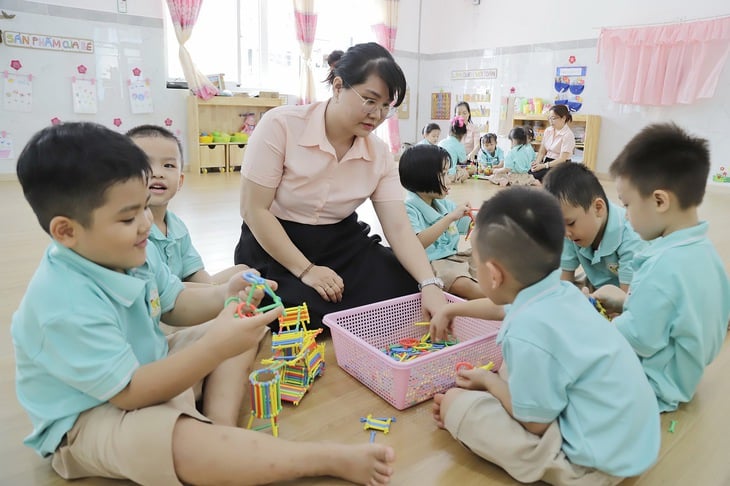
Classroom activities of teachers and students of the nursery class at Son Ca Kindergarten, Tan Binh District, Ho Chi Minh City in the newly built school - Photo: NHU HUNG
Limit other school fees
Also explaining at the group, in response to concerns that tuition exemption could lead to students transferring from private schools to public schools, Minister Nguyen Kim Son pointed out that the proportion of public schools is very high. As for non-public schools in Hanoi, according to Mr. Son, they are also willing to invest and in enrollment, there is also "a bit of a queue".
He said the Hanoi education sector has switched to online enrollment, but the numbers show that the number of students entering private schools in Hanoi is under no less pressure than public schools.
"Of course this concern must be considered, but the reality of enrollment in recent years shows that this concern is not too big," said Mr. Son.
Regarding the proposal to exempt tuition fees and limit the collection of other fees in schools, Minister Nguyen Kim Son said that extra teaching and learning in schools only applies to three groups: weak students, cases of nurturing excellent students, and students preparing for graduation exams.
Mr. Son affirmed that according to Circular 29, the school will not collect tuition fees for the three groups of students above. The consideration of support for schools and teachers will depend on each locality, but in principle it is the responsibility of the school.

Students at Lang Luong school, Tra Tap Primary Boarding School for Ethnic Minorities (Tra Tap commune, Nam Tra My district, Quang Nam) on the opening day of the new school year - Photo: TT
Regarding the form of payment, for public schools, the State will directly provide funds to the school based on the number of students. For non-public schools, the State will not pay tuition fees for students, but will partially support them by providing funds directly to students. This option is also suitable in the current digital transformation conditions.
In addition, in the conclusion of the General Secretary, he directed the ministry to come up with a plan to organize a second class for students, with the spirit of not collecting fees or tuition from students. Mr. Son said that the ministry is currently implementing the plan to apply from the new school year.
"Everything is aimed at public general education without tuition fees," Mr. Son added, saying that the current budget for education is at least 20% of the budget, of which 18% is spent on teachers' salaries throughout the system.
In response to concerns about localities not being able to balance their budgets, Minister Son said that currently, 10 provinces and cities nationwide are exempting tuition fees. For localities that are not able to balance their budgets, the central budget will provide compensation and support.
For early implementation, after these decrees are signed and take effect immediately, as a basis, even if they are implemented from the beginning of the school year in September 2025. The People's Councils of provinces and cities must have a basis to decide on the new support levels to be implemented. Therefore, when the resolution takes effect, the People's Councils will have a basis to consider the support levels.
According to Mr. Son, the principle of tuition exemption is to calculate tuition fees according to technical and economic standards to fully cover the costs for students. The Ministry is urgently submitting to the Prime Minister a draft decree to replace Decree 81 and Decree 97. It is expected that this decree will be completed in June. After the National Assembly's resolution is issued, the decrees will also be issued immediately to have a basis for implementation in practice.
For students studying general education programs at other types of educational institutions such as continuing education centers or studying general education programs at colleges, if they study general education programs there, they are exempted from tuition fees like other students. That is, students studying general education programs at other subjects are also considered exempted from tuition fees.
Universal preschool education for children 3 - 5 years old
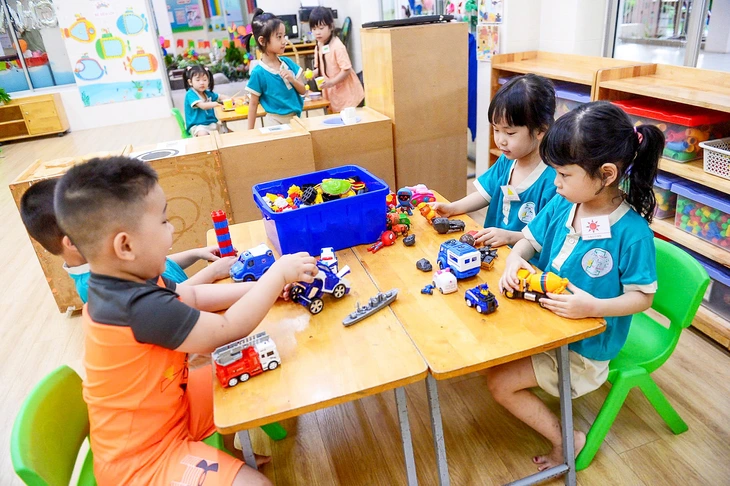
Students of Be Ngoan Kindergarten, District 1, HCMC Photo: TRUC PHUONG
According to the Government's submission, the draft resolution aims to complete universal preschool education for children aged 3-5 years nationwide by 2030.
Universalization is carried out according to a roadmap suitable to the socio-economic development conditions of the country, ensuring universalization conditions according to regulations. The draft is also built on the principle of mobilizing social resources to invest in developing preschool education in all forms according to the provisions of law.
The contents need to be specifically regulated in mechanisms and policies such as investment in developing school and classroom networks, facilities, and minimum teaching equipment.
In addition, it is necessary to ensure the number of preschool teachers according to prescribed standards, operating costs for public preschools, and at the same time supplement and amend policies for children.
Explaining at the group, Minister of Education and Training Nguyen Kim Son said that the resolution on universal preschool education is expected to be implemented in 5 years, so many delegates are worried, which is reasonable because the implementation is very elaborate but also full of challenges due to the need for many resources.
Minister Son emphasized that universalizing preschool education is very important, especially in mountainous areas to send children to Vietnamese language classes. He said he acknowledged all the opinions of the delegates. The resolution stated that the Government was assigned to develop a specific project for implementation.
Breakthrough policies on investment in developing preschool education; prioritizing the development of preschool education in mountainous areas, ethnic minority areas, islands, border areas, coastal areas, areas with difficult or especially difficult socio-economic conditions, and areas with industrial parks and export processing zones also need to be considered.
The draft also studies the development and promulgation of policies to encourage socialization and policies to develop preschool education in accordance with legal regulations.
Regarding impact assessment, according to the Government, people, especially direct beneficiaries of the policy, preschool children from 3 to 5 years old, have the opportunity to be mobilized to go to school and preschool classes to access quality education.
Child support policies contribute to reducing the economic burden on families in areas with particularly difficult socio-economic conditions, particularly difficult communes in coastal areas, islands, ethnic minority areas, mountainous areas, border areas, and communes in difficult areas as prescribed by the Prime Minister.
In particular, the policy attracts and recruits more preschool teachers, supports the team of managers, teachers, and preschool staff to work with peace of mind; creates conditions for young parents to have time to develop the family and local economy.
The budget for implementing the resolution, once approved, includes government resources to ensure universal preschool education (3-5 years old); additional state budget in addition to 20% of total education expenditure (according to the Law on Education) and other legal socialized capital sources.
Reviewing this content, Chairman of the Committee for Culture and Society Nguyen Dac Vinh emphasized the need to issue a resolution to ensure that children aged 3-5 years old can go to school, develop comprehensively, and prepare for grade 1. This is a step forward in realizing educational equity and clearly demonstrates the role of the State in caring for future generations.
Regarding implementation resources, the committee believes that to achieve the goal of universalizing preschool education for children aged 3-5 by 2030, huge financial and human resources are needed.
Specifically, regarding investment in facilities and equipment, the total estimated budget for implementation in the 2026 - 2030 period is 116,314.1 billion VND. The drafting agency needs to determine the roadmap for the 2026 - 2030 period.
There are opinions requesting the drafting agency to state its viewpoint on selecting the proposed options for consideration and decision by the competent authority. Regarding the teaching staff, the committee requests the drafting agency to clearly identify the number of preschool teachers that need to be added in the 2026-2030 period, report to the competent authority for consideration and decision.
There are suggestions that the drafting agency should add solutions to promote socialization of education to reduce pressure on teachers and facilities from the state budget.
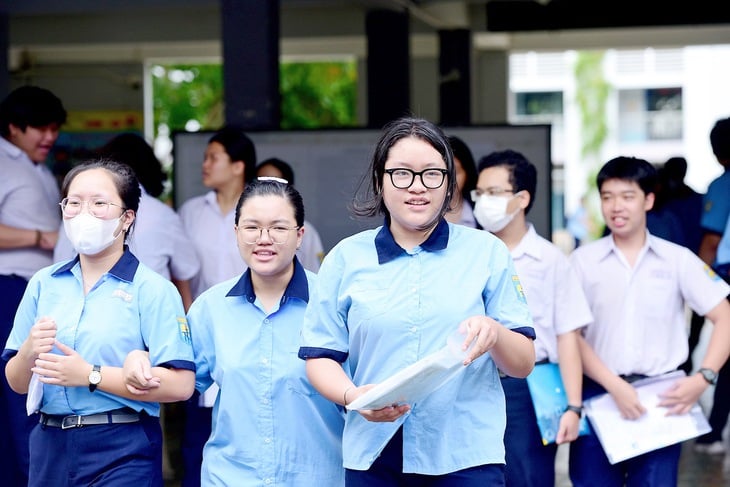
Grade 9 students take the 10th grade entrance exam in Ho Chi Minh City - Photo: DUYEN PHAN
Correct and humane policy
Discussing this content in the group, delegate Nguyen Anh Tri (Hanoi delegation) assessed that this is a correct, humane, and very necessary policy. Concerned about the number of 300,000 preschool children who have not yet gone to school, most of whom are in difficult circumstances and in remote areas, he suggested paying attention to the children of freelance workers, construction workers, street vendors, maids, garbage collectors, etc.
"There are families that are still in great difficulty, with low and unstable incomes. When organizing implementation, it is necessary to assign very specific and dedicated implementing units and the local government must really get involved," said Mr. Tri.
Many 7th graders do not speak Vietnamese fluently.
Delegate Truong Xuan Cu (Hanoi) also emphasized that the goal of preschool education in mountainous areas is mainly to popularize and learn Vietnamese. He recalled that in 2003, when he inspected several schools in the commune center of mountainous areas, he asked a student to stand up and read, but the class monitor stood up and said, "Teacher, that student is illiterate. In fact, many mountainous children up to grade 7 cannot speak Vietnamese fluently."
From there, he clearly stated that universalizing preschool education in remote, mountainous areas is very important. Besides, if freelance workers are not supported, their children's education will also be very difficult.
However, he suggested that provinces and cities need to develop projects suitable for each locality. For example, in a mountainous area where 3 communes are merged, each living a whole hill away from each other, with only 4-5 children, where will the school be located and how will teachers be mobilized?
Kindergarten teachers have it tough.
Delegate Nguyen Quoc Luan (Yen Bai) said that currently, preschool teachers in remote areas are facing difficulties due to lack of facilities, equipment, and teachers. Recruitment of staff and teachers is not possible, some localities are short of 200 teachers, while in mountainous areas there is no source of recruitment.
"There are cases where we have recruited them but they left the next day after packing their bags. In addition, the nature of the preschool education profession makes recruitment difficult and schooling difficult. Some localities have issued a resolution of the Provincial People's Council to support children's lunches at 160,000 VND/month/child for children who do not receive lunch because the commune is recognized as a new rural area but still faces difficulties," said Mr. Luan.
Therefore, Mr. Luan said that the draft resolution needs to clearly stipulate preferential policies, specific investment in facilities and equipment for these areas, specific incentives for training, fostering and recruiting staff and teachers for these facilities, and sufficient human resources to carry out the work.
If this preferential regulation is not clear and complete, but the preferential policy mechanism needs to be clearly stated, then highland and preschool education can meet the needs of educational investment development in remote and isolated areas.
Ensuring children's right to education
Delegate Nguyen Thi Yen (Ba Ria - Vung Tau) suggested considering adding more coordination responsibilities of organizations, enterprises and non-public facilities in implementation, especially industrial parks, export processing zones and migrant areas.
In reality, there is a large number of children aged 3-5 who cannot go to school due to lack of public facilities or high tuition fees, so defining the responsibility of non-state entities will contribute to ensuring children's right to education and reducing the burden on the budget.
Many mechanisms for people to choose from
Chairman of the National Assembly's Economic and Financial Committee Phan Van Mai said that the tuition exemption and reduction policy must cover all subjects, however, each person in society has a different income. Among those with high incomes, the support of several hundred thousand VND/month is not much compared to the family conditions of their parents.
Mr. Mai cited Ho Chi Minh City's experience in implementing policies to support people affected by COVID-19, many people voluntarily refused to receive support. Therefore, according to Mr. Mai, the resolution needs to add a recognition mechanism and allow recipients to choose whether or not to receive the policy. "This is a very good idea, I suggest taking note so that the drafting agency can add that mechanism," Mr. Mai said.
Poll
National Assembly delegates suggested that there should be a mechanism to allow parents to voluntarily not receive support policies and exempt tuition fees. According to you:
You can select 1 item. Your vote will be public.
Source: https://tuoitre.vn/som-mien-hoc-phi-tu-mam-non-toi-pho-thong-2025052307522725.htm




![[Photo] Top players gather at the 2025 Nhan Dan Newspaper National Table Tennis Championship](https://vphoto.vietnam.vn/thumb/1200x675/vietnam/resource/IMAGE/2025/5/23/9ad5f6f4faf146b08335e5c446edb107)







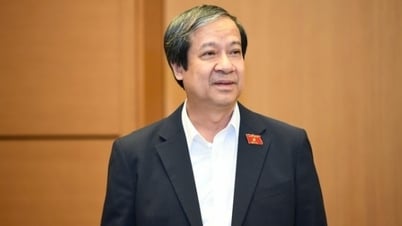



























































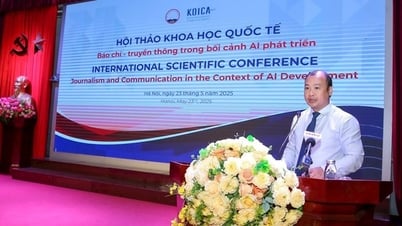


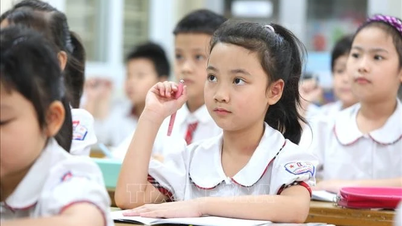

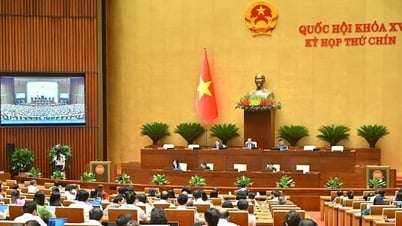



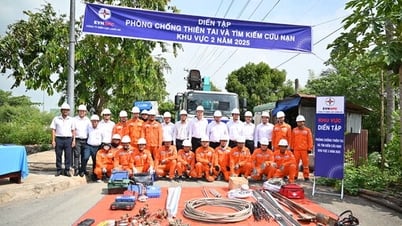

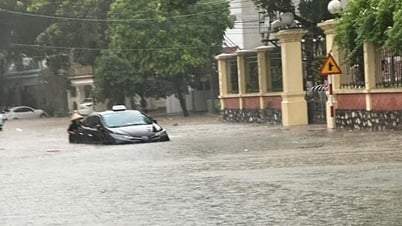












Comment (0)